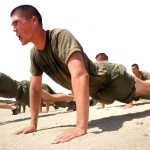The Army's War on Fat

If you need a reason to care about the politics of obesity, look no further than national security. Seriously.
Yesterday, Mission: Readiness, a non-profit organization of retired military leaders, released Too Fat to Fight, a report on the national security risks posed by America’s epidemic of fat. The report’s message isn’t exactly top secret. Senior recruiting officers concluded a year ago that 48,000 recruits had been rejected for military service solely because of obesity since 2005.
So it’s no surprise that the military establishment is supporting anti-obesity campaigns through organizations like Mission: Readiness. The military’s concerns about rising obesity rates are shared by a growing number of senior Republicans, including former Senate Majority Leader Bill Frist, former Arkansas Governor Mike Huckabee, Senator Dick Lugar, and Oklahoma City Mayor Mike Cornett.
The problem is not abstract. Take that 48,000 figure. We can’t assume that all of those recruits would have ended up in combat roles. But suppose they had, and all of them had been available for combat duty in Afghanistan or Iraq. If so, their enlistment would have been worth a dozen heavy brigades of additional capability, when capacity was urgently needed. But because those rejected recruits couldn’t even maintain an acceptable diet before enlisting, they never saw wars they were volunteering to fight.
It’s not just the rejected recruits who are in trouble. These days, soldiers can find fast food and subsidized fructose just as easily as civilians can. Even as the Army rejects the obese, those already in uniform are bulking up as well. According to a 2009 Pentagon report, obesity suddenly spiked in the Army after 2003. Now, at least 1 in 20 servicemen and women on active duty are “clinically overweight.”
The problem extends right up the supply chain to the front line. As of the end of April, U.S. bases in Afghanistan must shut down their Popeye’s, Burger King, and Pizza Hut franchises by order of General McChrystal. In previous wars, the U.S. Army was already the best fed army on the planet. But that wasn’t enough; G.I.s now deploy with the same fatty, sodium-rich foods that their cousins eat back home. (To be fair, American troops aren’t the only indulgers: Canadian troops fighting in Southwest Afghanistan have their own Tim Horton’s, offering donuts and coffee served ‘double-double.’)
McChrystal’s staff justified the policy as a matter of logistics, insisting shipments of fries and milkshakes were filling shipping and storage space needed for reinforcements, ammunition and combat supplies.
In the only editorial I could find condemning the move, The Washington Times blamed the change on McChrystal’s spartan lifestyle, arguing that the General expected soldiers to live as modestly as he did. The paper felt it was “destroying morale” to deny G.I.s the thousand-calorie comforts of home, insisting there is “no clear evidence that fast food interferes with mission effectiveness.”
That’s not actually true. Consider this: the Army is having trouble keeping Americans fit, even in a job where officers can simply order you to exercise if you show up lacking the necessary motivation. Yet in Iraq, as unhealthy food options multiply and operational tempos slow down, obesity is winning its own little war. That same 2009 Pentagon report called the Army’s eating binge “a significant military medical concern because it is associated with decreased military operational effectiveness”– a direct contradiction of the Washington Times’ argument. Soldiers who overeat on Iraq duty supposedly have a nickname for the consequences: the “Baghdad Bulge.”
America is not the only country fretting about the fighting fitness of future generations. And America’s largest military rival is raising similar concerns as unhealthy diets and poor fitness become a global phenomenon. In China this past March, the President of the Beijing Sports University lashed out publicly at his own nation’s bureaucrats, complaining that the next generation of young Chinese wouldn’t be physically capable of fighting a future ground war (Japan was his hypothetical enemy of choice).
If the United States hopes to defend itself and its interests in places with bad roads, thick jungles, hot deserts or high mountains, the health of the average volunteer soldier is going to have to improve, and fast. The culture of gluttony is fuelling an explosion in health costs for America’s civilian population. So it’s no surprise to see the side effects appear amongst those Americans brave enough to serve in uniform.